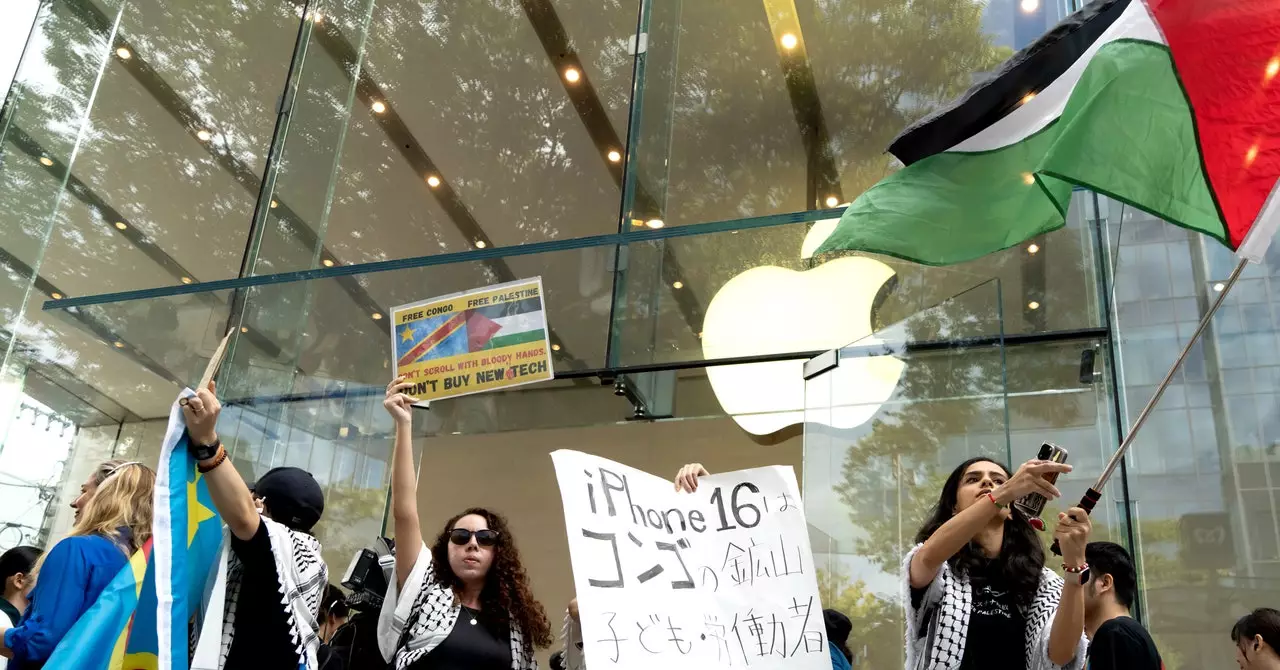On Friday, Apple enthusiasts worldwide gathered in stores to celebrate the highly anticipated launch of the iPhone 16. However, the excitement of customers was starkly contrasted by demonstrations led by former and current Apple employees who are calling for the tech giant to reevaluate its sourcing practices. The protests, organized by the group Apples Against Apartheid, underscore a growing discontent regarding Apple’s mineral supply chains, particularly its cobalt sourcing from the Democratic Republic of the Congo (DRC), a region infamous for human rights abuses. The enthusiasm associated with a significant corporate event was met with critical scrutiny, revealing the ethical challenges that accompany modern consumerism.
Cobalt, an essential component in lithium-ion batteries, is primarily mined in the DRC, where exploitative mining practices are prevalent. While Apple claims to ensure ethical sourcing of materials, evidence suggests persistent issues involving dangerous working conditions, inadequate compensation, child labor, and human rights violations. Protesters wielding placards stating “Profiting from genocide” aimed to highlight these discrepancies. Apple has defended its stance by stating that it does not obtain minerals from mines that proliferate these injustices, although it admitted ongoing difficulties in fully tracing its mineral supply chain—a situation that allowed for the removal of 12 suppliers last year. The tension rises even further as the DRC’s government raises concerns about potential ties to “blood minerals,” amplifying the urgency for corporate accountability in ethical sourcing.
The protests were not confined to a single location; they echoed across ten countries, with demonstrators converging on Apple stores from Bristol to Mexico City. Although the numbers varied—Berlin witnessing the largest turnout of over 30 protestors—the consistent themes of their messages remained clear. Collaborating with local activist organizations, Apples Against Apartheid has managed to attract attention to their cause, although it’s worth noting that many participants were not Apple employees. This disconnect raises questions about the movement’s reach and the level of engagement from Apple’s current workforce in advocating for ethical shifts within the company.
The protests also demanded that Apple articulate its position regarding the ongoing humanitarian crisis in Gaza, which has been described as genocide by a number of human rights advocates. This multifaceted agenda has introduced an additional layer to the protesters’ demands, compelling Apple—a corporation known for its strong marketing messages about social responsibility—to respond to not only environmental challenges but socio-political issues as well. The dual focus reflects a growing expectation from corporations to take stands on global crises rather than remaining silent in the face of overwhelming evidence of global injustices.
With social media amplifying protest messages and increasing awareness about the ethical concerns surrounding tech giants, Apple faces mounting pressure to improve its practices. While the company has made strides in announcing partnerships and initiatives aimed at responsible sourcing, the effectiveness and transparency of these efforts have been frequently questioned. Additionally, the incident at the Berlin protest—where multiple arrests were made as police attempted to dispel demonstrators—highlights the potential repercussions of challenging corporate practices publicly. As consumers grow increasingly aware of the moral implications of their purchases, Apple must navigate these turbulent waters with both caution and sincerity.
Ultimately, the events surrounding the iPhone 16 launch remind us of the intricate web connecting consumer behavior, global supply chains, and ethical standards. As society becomes more aware of the implications of capitalist practices, demands for corporate accountability are likely to grow. Apple’s challenges are emblematic of a larger trend where consumers are unwilling to separate enjoyment of products from the moral and ethical dimensions of their production. As the dialogue continues, both within the corporate halls of Apple and among the consumers who demand change, the road ahead may require a fundamental reassessment of what it means to be a responsible global citizen in the tech industry.

